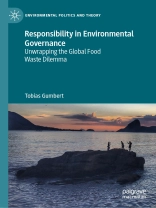This book provides a comprehensive study of the notion of responsibility in environmental governance. It starts with the observation that, although the rhetoric of responsibility is indeed all-pervasive in environmental and sustainability-related fields, decisive political action is still lacking. Governance architectures increasingly strive to hold different stakeholders responsible by installing accountability and transparency mechanisms to manage environmental problems, yet the structural background conditions affecting these issues continue to generate unevenly distributed, socially unjust, and ecologically devastating consequences. Responsibility in Environmental Governance develops the concept of responsibility as an analytical approach to map and understand these dynamics and to situate diverse meanings of responsibility within larger socio-political contexts. It applies this approach to the study of food waste governance, uncovering a narrow governance focus on accountability, optimization, and consumer behavior change strategies, opening up spaces for organizing more democratic solutions to a truly global problem.
Tabella dei contenuti
Chapter 1: Responsibility and the Environment – What’s at Stake?.- Chapter 2: Environmental Governance and the Organization of Irresponsibility.- Chapter 3: The Narrow Conception of Responsibility in Environmental Governance.- Chapter 4: Ethics, Justice, and Power: Widening the Meaning(s) of Responsibility.- Chapter 5: Responsibility and Interpretive Research.- Chapter 6: Food Waste Governance – Introduction to the Case Study.- Chapter 7: Tracing the Meanings of Responsibility in Food Waste Governance.- Chapter 8: Contextualizing Responsibilit(ies) in Food Waste Governance.- Chapter 9: Conclusion – Towards Institutions of Forward-Looking Collective Responsibility.
Circa l’autore
Tobias Gumbert is a postdoctoral researcher and lecturer at the Institute of Political Science and the Center for Interdisciplinary Sustainability Research at the University of Münster, Germany. He works on contemporary issues of environmental politics, particularly in the areas of food policy, waste policy, sustainable consumption, and democratic governance.












